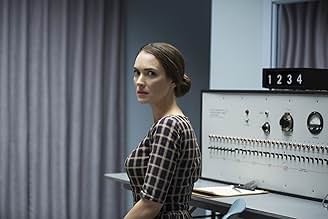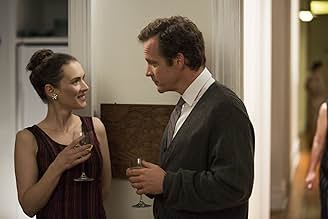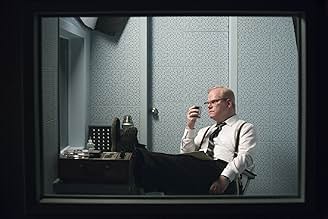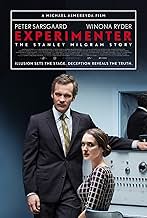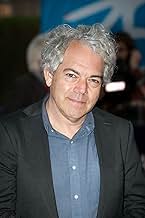IMDb RATING
6.6/10
21K
YOUR RATING
In 1961, famed social psychologist Stanley Milgram conducted a series of radical behavior experiments that tested ordinary humans' willingness to obey authority.In 1961, famed social psychologist Stanley Milgram conducted a series of radical behavior experiments that tested ordinary humans' willingness to obey authority.In 1961, famed social psychologist Stanley Milgram conducted a series of radical behavior experiments that tested ordinary humans' willingness to obey authority.
- Awards
- 3 wins & 6 nominations total
Ned Eisenberg
- Solomon Asch
- (as Ned Eisenburg)
- Director
- Writer
- All cast & crew
- Production, box office & more at IMDbPro
Featured reviews
Yes, as many other reviewers have eluded, the movie can be a bit dry. My wife got lost in the message because she lost interest rather quickly. It wasn't until I explained the message the movie was trying to convey that she seemingly became more interested.
**spoiler** Watch it until the end, the message is rather powerful. I specifically liked the ending because (Sasha) Stanley's wife allowed herself to fall in the same class when the nurse made her fill the paperwork while Stanley is having a heart attack. In this instance, I felt like I would have called BS and told the nurse to get a doctor ASAP, instead of calmly filling out the paperwork like she was doing. But then again, that's exactly the message the movie was delivering, that we easily follow orders without question even against what we think is right.
**spoiler** Watch it until the end, the message is rather powerful. I specifically liked the ending because (Sasha) Stanley's wife allowed herself to fall in the same class when the nurse made her fill the paperwork while Stanley is having a heart attack. In this instance, I felt like I would have called BS and told the nurse to get a doctor ASAP, instead of calmly filling out the paperwork like she was doing. But then again, that's exactly the message the movie was delivering, that we easily follow orders without question even against what we think is right.
Peter Sarsgaard ('Black Mass and 'The Killing')stars as Professor Stanley Milgram who conducted a range of experiments as a social psychologist. His most famous/notorious were his 'obedience tests'. He conducted these using volunteers who were told to electrocute a stranger if they answered any pre set question wrong in a controlled environment. The doses increased as the test progressed. His wife is played by the wonderful Winona Ryder.
His results caused him both fame and derision and he is still used and cited widely today. The film follows the life of Milgram, his family and marriage and some of his personal acquaintances. Sarsgaard, as ever, is excellent and convincing but there are some filmatic techniques that were a bit odd. There is deliberate use of fake backgrounds - as if it were a play – in some of the scenes. There is also the use of an Indian elephant for two corridor scenes which is left totally unreferenced!?
This could be the elephant in the room has already escaped and is amongst us? I do not know but it is a great centre piece to get you thinking. And that is what this film is really about – challenging and questioning our ideas and ideals about who we are and how we would act if confronted with the self same situations. He called it the 'agentic state' whereby we say 'we were just following orders', or 'it's the law' or worse 'I was told to do it'. I find this sort of discussion fascinating and there is much more here in this film about Milgram's work. One I really enjoyed and feel easy to recommend even with the elephant.
His results caused him both fame and derision and he is still used and cited widely today. The film follows the life of Milgram, his family and marriage and some of his personal acquaintances. Sarsgaard, as ever, is excellent and convincing but there are some filmatic techniques that were a bit odd. There is deliberate use of fake backgrounds - as if it were a play – in some of the scenes. There is also the use of an Indian elephant for two corridor scenes which is left totally unreferenced!?
This could be the elephant in the room has already escaped and is amongst us? I do not know but it is a great centre piece to get you thinking. And that is what this film is really about – challenging and questioning our ideas and ideals about who we are and how we would act if confronted with the self same situations. He called it the 'agentic state' whereby we say 'we were just following orders', or 'it's the law' or worse 'I was told to do it'. I find this sort of discussion fascinating and there is much more here in this film about Milgram's work. One I really enjoyed and feel easy to recommend even with the elephant.
This movie is about Stanley Milgram, arguably one of the most important social psychologists in our field, and specifically about one of his most important experiment - his obedience to authority experiment.
The movie depicts to my knowledge accurately the setup, conduction, and results of the experiment and goes further, crafting an interesting and weighted portrayal of the man that Stanley Milgram was. The acting is low key, Peter Sarsgaard especially delivers a down to earth performance which shows that he rigorously prepared for the role. All supporting characters (e.g. Winona Ryder, Anton Yelchin) do a good job and no one distracts from the key issues raised by the experiment.
Cinematography is good, although nothing special. Occasionally there are creative moments in direction. When the 4rth wall is broken by Sarsgaard and he speaks directly to the audience, weird things happen in the background, making these moments very endearing and interesting.
There are no thrills or action in this movie, as well as no conventional drama. It is kind of a biopic with a twist, although I would say the biographic aspect is downplayed by the focus on this specific experiment. Many scientific issues are addressed on a side note (e.g. the ethical code of doing experiments, which triggered the proliferation of ethical committees for scientific research).
I would recommend this movie to people who are interested in science, more specifically in psychology (but not exclusively), that do not need action, drama, or thrills and enjoy a well researched and crafted movie with good acting.
The movie depicts to my knowledge accurately the setup, conduction, and results of the experiment and goes further, crafting an interesting and weighted portrayal of the man that Stanley Milgram was. The acting is low key, Peter Sarsgaard especially delivers a down to earth performance which shows that he rigorously prepared for the role. All supporting characters (e.g. Winona Ryder, Anton Yelchin) do a good job and no one distracts from the key issues raised by the experiment.
Cinematography is good, although nothing special. Occasionally there are creative moments in direction. When the 4rth wall is broken by Sarsgaard and he speaks directly to the audience, weird things happen in the background, making these moments very endearing and interesting.
There are no thrills or action in this movie, as well as no conventional drama. It is kind of a biopic with a twist, although I would say the biographic aspect is downplayed by the focus on this specific experiment. Many scientific issues are addressed on a side note (e.g. the ethical code of doing experiments, which triggered the proliferation of ethical committees for scientific research).
I would recommend this movie to people who are interested in science, more specifically in psychology (but not exclusively), that do not need action, drama, or thrills and enjoy a well researched and crafted movie with good acting.
"How do civilized human beings participate in destructive inhumane acts?" Wanting to discover why humans do things that seem cruel and unusual to other humans psychologist Stanley Milgram (Sarsgaard) begins to conduct a series of social experiments. The more people he tests the more worried he becomes about the results, and about the fate of mankind. This is a very good movie, but not a movie for everyone. This movie is a little like the Masters of Sex TV show in the way that you watch an experiment being conducted and how the creator is treated. The movie is very interesting and having known very little about the real experiment it kept me interested and worried at the results as well. There is very little action in this and the movie for the most part is Saarsgaard talking to the audience and trying to explain his method, but I really thought it was interesting and I was surprised as to how much I enjoyed it. Overall, not a movie for everyone, but anyone studying psychology will love this movie. I give this a B.
In 1961 Dr Stanley Milgram performed a series of experiments that revolutionised our understanding of human behaviour, particularly with regard to obedience. It went a long way to explaining how the Nazis managed to carry out the Holocaust and explaining other historic events. This is the story of Dr Milgram, this famous experiment and his other work.
A simple yet effective telling of one of the great breakthroughs in sociology / psychology. Is quite a dry telling, with fairly low production values, but it largely works. Quite interesting, especially as you hear about the results of the main experiment plus some of the other experiments Professor Milgram performed.
As mentioned, it is quite dry though, so can feel a bit dull at times. We don't learn much about Milgram himself, even though much of his life is shown. His family life seems more like padding than anything else (even if his wife is played by the wonderful Winona Ryder).
Solid enough performance by Peter Sarsgaard in the lead role. Good supporting cast. Taryn Manning does look out of place though, playing a 1960s housewife. Maybe it is because I kept thinking of her as Pennsatucky in Orange is the New Black!
A simple yet effective telling of one of the great breakthroughs in sociology / psychology. Is quite a dry telling, with fairly low production values, but it largely works. Quite interesting, especially as you hear about the results of the main experiment plus some of the other experiments Professor Milgram performed.
As mentioned, it is quite dry though, so can feel a bit dull at times. We don't learn much about Milgram himself, even though much of his life is shown. His family life seems more like padding than anything else (even if his wife is played by the wonderful Winona Ryder).
Solid enough performance by Peter Sarsgaard in the lead role. Good supporting cast. Taryn Manning does look out of place though, playing a 1960s housewife. Maybe it is because I kept thinking of her as Pennsatucky in Orange is the New Black!
Did you know
- TriviaThe real William Shatner did in fact portray Stanley Milgram in The Tenth Level (1976) which was filmed several years after Star Trek (1966) ended.
- GoofsThe Coca-Cola cans are from the late 60s into the 70s. Not from 1961, the time of the movie.
- Quotes
Stanley Milgram: I believe we are puppets with perception, with awareness. Sometimes we can see the strings. And perhaps our awareness is the first step in our liberation.
- Crazy creditsA cast credit: "Elephant in the Room: Minnie"
- ConnectionsFeatures Candid Camera (1960)
- SoundtracksSome Enchanted Evening
Written by Richard Rodgers & Oscar Hammerstein II
Performed by Mantovani Orchestra and Chorus (as Mantovani Orchestra)
Courtesy of Drew's Entertainment
- How long is Experimenter?Powered by Alexa
Details
- Release date
- Country of origin
- Official sites
- Language
- Also known as
- El experimento de Milgram
- Filming locations
- New York City, New York, USA(location)
- Production companies
- See more company credits at IMDbPro
Box office
- Budget
- $1,700,000 (estimated)
- Gross US & Canada
- $155,575
- Opening weekend US & Canada
- $8,682
- Oct 18, 2015
- Gross worldwide
- $224,145
- Runtime1 hour 38 minutes
- Color
- Aspect ratio
- 1.78 : 1
Contribute to this page
Suggest an edit or add missing content





